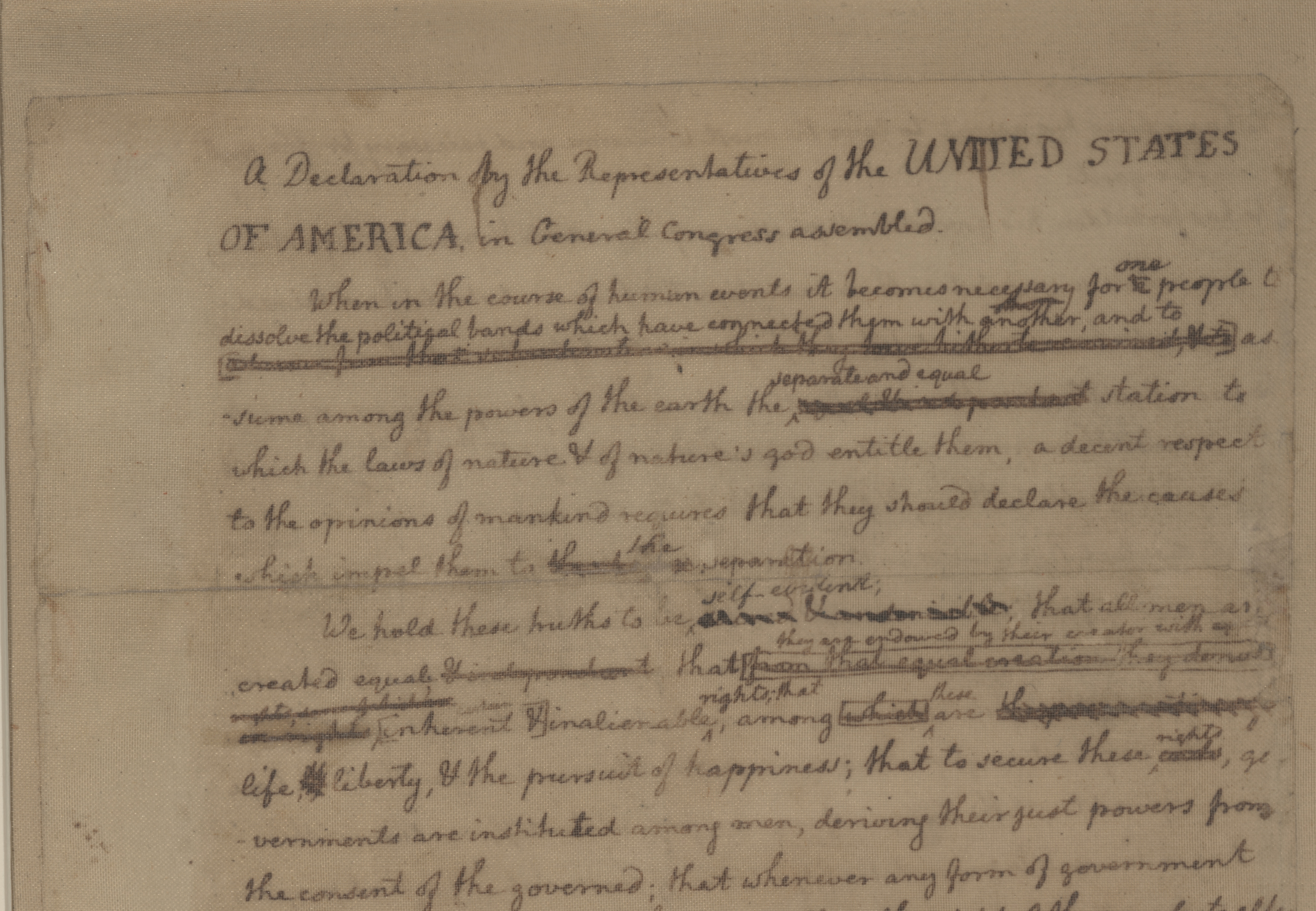Prior to the famous extinction of the dinosaurs, another mass extinction paved the way for their emergence, an emergence that happened much faster than previously thought, says The Economist.
All Articles
Be an individual, just like everyone else. Laurie Essig at True/Slant says American culture prioritizes creativity in romantic relationships in a way that dictates conformity and materialism.
New York magazine’s cover story on the (negative) impact of children on happiness begs a larger question—and one appropriate so near to Independence Day (“life, liberty, and the pursuit” etc.): […]
In The Declaration of Independence, Thomas Jefferson referred to his fellow Americans as “citizens.” But in an early draft of the document, it’s clear that he originally used some other […]
The vuvuzela is not a popular instrument outside of South Africa. World Cup players from other nations complain that it breaks their concentration, broadcasters have trouble making their commentaries heard […]
“Those who haven’t abandoned Juárez may be watching the death of it, both day and night.” Sarah Hill gives a tragic account of the Mexican city gone from boom to bust to nearly dust.
One of the big business stories this side of the pond, is Rupert Murdoch’s attempt to buy the 61% of shares in Sky Television that he doesn’t own. Mr Murdoch, […]
“It seems like we in the West have made a tradeoff between self-reliance and physical comforts and social well being. So, which is more important?” asks a Notre Dame psychology professor.
“What exactly is the Iranian threat?” asks Noam Chomsky in his latest article. The linguist turned political activist finds glaring hypocrisies in U.S. foreign policy toward the Middle East.
“Fiction has now become a museum-piece genre most of whose practitioners are more like cripplingly self-conscious curators or theoreticians than writers,” says the polemical Lee Siegel.
In just 3,000 years, an evolutionary microsecond, Tibetans have developed a unique version of a gene that helps them adapt to living at high altitudes. This according to a study published in Science.
“Just as healthy optimism can turn into irrational exuberance, a clear-eyed realism about the challenges facing the United States can gradually inflate a pessimism bubble,” says Ross Douthat today.
If Americans have an impending sense that our present moment represents a capitalized End of Something, let us take the moment to exhale and appreciate the tranquility of finality.
Gary Becker and Richard Posner at the University of Chicago weigh in on the Gulf oil leak. Did BP make a good-faith estimate of the risk entailed by deep-water drilling or was it negligent?
If not humans, is God to blame for recent natural disasters? What are the limits of divine and human agency? The New Yorker explains a philosophical twist whereby divinity is expressed through free will.
“With deception so significant a part of the natural world, it’s little wonder we resort to it almost reflexively. Indeed, who’s not to say that lying isn’t an in-built part of human nature?” asks the Independent.
David Brooks’s recent love letter to Christopher Hitchens called (respectfully) only glancing attention to the celebrated author’s current battle with cancer; instead, Brooks focused on how important Hitchens is to […]
Theoretical physicist and futurist Michio Kaku, who writes the Dr. Kaku’s Universe blog for Big Think, is appearing on Comedy Central’s “The Colbert Report” tonight at 11:30 to talk about […]
Recently we wrote about emerging models for Research (the “R” in R&D) and how the US government can encourage and support them. But what about Development – the “D” in R&D? […]
The Fourth of July is one of our most patriotic holidays. The famous portrait of Revolutionary era soldiers marching with fife and drum is one of its most recognized symbols, […]
Murdoch is putting up paywalls and Jobs is censoring risqué apps. Have we reached the limits of free information exchange that everyone predicted from the Internet? What’s coming next?
The novels of Jules Verne and H.G. Wells, along with relics of Victorian technology, have inspired a new cult following called “Steampunk.” The group celebrates the Victorian spirit.
Just give money to the poor, says a new book by the same name. In it, three British professors say direct cash payments to the developing world’s poor will help economies to grow.
“The letters of Pliny the Younger provide gripping insight into Roman life — and the last hours of a city.” Michael Dirda reviews the eruption of Mt. Vesuvius and the destruction of Pompeii.
“What’s so bad about deflation?” asks Slate. “After all, it’s a pleasant surprise when prices of many items fall.” As it turns out, there is good deflation and bad deflation, but which is which?
Documentation made during the late 1960s of how one liberal German after-school center attempted to teach sexual liberation demonstrates the thin line between freedom and abuse.
Robert Grenier, a former CIA station chief in Pakistan, can envision only breakdown in Afghanistan: Congress has divergent goals and counter-insurgency tactics are insufficient.
“We love them, of course, but new research suggests that having children makes us unhappy — it’s just that none of us feels able to admit it.” The Independent researches a taboo issue.
The Search for Extraterrestrial Intelligence, or SETI, made assumptions quite different from Stephen Hawking’s dire warnings about aggressive alien life. Should we keep looking?
Matthias Ringmann, a minor scholar and cartographer working in landlocked Eastern France, was responsible for putting America on the map, literally. History, however, has since forgotten him.







